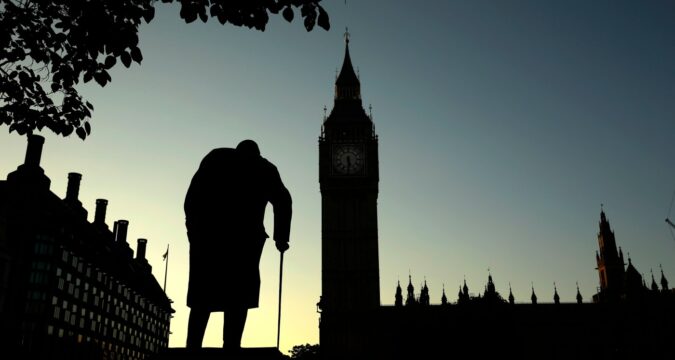
Winston Churchill, the towering British statesman who served as prime minister during World War II, was once asked by an American student how to become a successful leader. Churchill’s advice: “Study history, study history. In history, lie all the secrets of statecraft.”
Frank Gavin, a professor at the Johns Hopkins University School of Advanced International Studies and the director of the university’s Kissinger Center, believes Churchill was on to something.
Gavin argues that studying history, fascinating in its own right, can also be exceptionally helpful to aspiring statesmen and stateswomen. Examining the past does not provide ironclad laws of human behavior or a clear blueprint for the future. However, if investigated carefully, history can help leaders better appreciate complexity, uncertainty and ambiguity in public affairs. It teaches leaders to ask hard questions, reexamine long-held assumptions, appreciate irony and be modest — even humble — about what they think they know.
Gavin believes the skills needed to understand history can translate into practical tools for aspiring statespeople to confront contemporary problems and craft future strategies. He argues that grappling with consequential or contested historical questions is strikingly similar to making critical choices about governance.
“A rigorous understanding of the past provides insights and tools that enable better choices in the present. This is especially true in the extraordinarily consequential worlds of statecraft and strategy,” Gavin writes in his compelling new book “Thinking Historically: A Guide to Statecraft and Strategy.” He adds: “It may seem obvious that we should employ history to improve decision-making, but it is rarely done.”
Gavin is the professor you always wanted. He’s whip-smart, quick-witted, hugely interesting, deeply inquisitive, intellectually bold and kind-hearted. An expert on nuclear policy and international finance, he has taught at the Massachusetts Institute of Technology, the University of Texas and now at Johns Hopkins. Gavin’s writing is nuanced and compelling. It’s also fun, with serious analysis lightened by references to the “Top Gun” movies, “Charlie Brown” Christmas specials and contentious family vacations to history-rich Colonial Williamsburg and Harpers Ferry.
His passion project is to persuade policymakers to use history to improve their approach to governing. He also implores historians to make their work more accessible to busy policymakers by avoiding hyper-esoteric subjects and turgid language. He’s convinced there has been too little effort to instruct decision-makers on how to use history or to train historians on how to engage with the policy world.
Gavin urges leaders to develop “historical sensibility” — a temperament that appreciates and embraces life’s unpredictable rhythms, baffling surprises and head-spinning coincidences. Historical sensibility emanates from a tolerance for, and appreciation of, unintended consequences, stunning reversals and sheer luck in human affairs.
He also urges policymakers to learn to think historically. This requires a set of skills to interrogate the past by probing deeply, constructing and reconstructing chronologies, and contemplating counterfactuals in which different decisions might have significantly altered subsequent events.
This may sound abstract, but Gavin offers concrete examples. For instance, former Federal Reserve Board Chair Ben Bernanke was also a respected scholar of the Great Depression. Gavin argues that as the world unraveled during the 2008 financial crisis, Bernanke drew on his understanding of economic history to grasp the scope of the challenge, recognize the importance of global coordination and embrace out-of-the-box thinking. The Fed chair’s grounding in history liberated him from rigid doctrines and encouraged innovative policymaking.
Gavin’s book provides tools for policymakers to interrogate the past: Ask penetrating questions, examine key assumptions, search for pivotal turning points, and consider multicausal explanations of events and developments. He also offers a historical checklist for leaders as they consider current problems and future strategies. The fundamental questions he believes they should ask include: How did we get here, what else is going on, what are our unspoken assumptions, what is really important, what are the most likely outcomes, what else could happen, how rapid is the pace of events and is anything inevitable?
“A deep and rigorous engagement with the practice of history provides a better way to see, know, and act in a world where decision-makers confront complexity and radical uncertainty about the future,” he writes.
I think Churchill would have loved Gavin’s book and would have encouraged aspiring statespeople to study it carefully and reflect on how the study of the past can help us navigate the present and prepare for the future.
“The longer you can look back,” Churchill once said, “the farther you can look forward.”
John T. Shaw is director of the Paul Simon Public Policy Institute. Shaw’s columns, exclusive to the Tribune, appear the last Monday of each month. His most recent book is “The Education of a Statesman: How Global Leaders Can Repair a Fractured World.”
Submit a letter, of no more than 400 words, to the editor here or email letters@chicagotribune.com.
https://www.chicagotribune.com/2025/10/27/column-frank-gavin-history-governing-statesmanship-shaw/